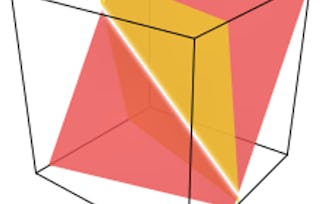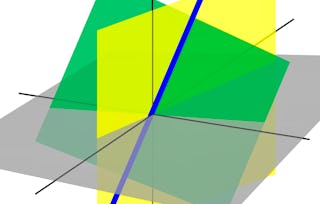This is the third and final course in the Linear Algebra Specialization that focuses on the theory and computations that arise from working with orthogonal vectors. This includes the study of orthogonal transformation, orthogonal bases, and orthogonal transformations. The course culminates in the theory of symmetric matrices, linking the algebraic properties with their corresponding geometric equivalences. These matrices arise more often in applications than any other class of matrices.

Linear Algebra: Orthogonality and Diagonalization
Seize the savings! Get 40% off 3 months of Coursera Plus and full access to thousands of courses.

Linear Algebra: Orthogonality and Diagonalization
This course is part of Linear Algebra from Elementary to Advanced Specialization

Instructor: Joseph W. Cutrone, PhD
Top Instructor
3,857 already enrolled
Included with
46 reviews
Details to know

Add to your LinkedIn profile
11 assignments
See how employees at top companies are mastering in-demand skills

Build your subject-matter expertise
- Learn new concepts from industry experts
- Gain a foundational understanding of a subject or tool
- Develop job-relevant skills with hands-on projects
- Earn a shareable career certificate

There are 4 modules in this course
Earn a career certificate
Add this credential to your LinkedIn profile, resume, or CV. Share it on social media and in your performance review.
Instructor

Offered by
Explore more from Machine Learning
 Status: Free Trial
Status: Free TrialJohns Hopkins University
 Status: Free Trial
Status: Free TrialJohns Hopkins University
 Status: Free Trial
Status: Free TrialJohns Hopkins University
 Status: Free Trial
Status: Free TrialImperial College London
Why people choose Coursera for their career

Felipe M.

Jennifer J.

Larry W.

Chaitanya A.
Learner reviews
- 5 stars
91.30%
- 4 stars
6.52%
- 3 stars
2.17%
- 2 stars
0%
- 1 star
0%
Showing 3 of 46
Reviewed on Nov 4, 2024
It is great, the guy on the videos knows a lot, its a pity he writes so fast :))
Reviewed on Mar 30, 2025
Well taught, clearly explained, thorough and helpful examples throughout
Reviewed on Dec 8, 2024
Teach good. It explore some of my blind areas about diagonalization, eigen and orthogonal, repeated roots concern, etc.

Open new doors with Coursera Plus
Unlimited access to 10,000+ world-class courses, hands-on projects, and job-ready certificate programs - all included in your subscription
Advance your career with an online degree
Earn a degree from world-class universities - 100% online
Join over 3,400 global companies that choose Coursera for Business
Upskill your employees to excel in the digital economy

